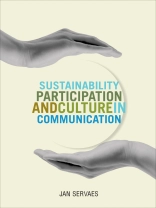At a time when sustainability is on everyone’s lips, this volume is one of the first to offer an overview of sustainability and communication issues – including community mobilization, information technologies, gender and social norms, mass media, interpersonal communication and integrated communication approaches – from a development and social change perspective. Drawing on contemporary theories of communication as well as real-world examples from development projects around the world, the contributors in this collection showcase the increasing richness and versatility of communication research and practice. Together, they make a case for adopting a more comprehensive perspective on communication in the areas of development and social change.
Inhaltsverzeichnis
Introduction: The Kaleidoscope of Text and Context in Communication – Jan Servaes
Chapter 2: Powerful Beyond Measure? Measuring Complex Systemic Change in Collaborative Settings – Adinda Van Hemelrijck
Part I: Sustainable Social Change
Chapter 3: The Global Agenda: Technology, Development, and Sustainable Social Change – Toks Dele Oyedemi
Chapter 4: ICTs and Mobile Phones for Development in Sub-Saharan African Region – Tokunbo Ojo
Chapter 5: Fair-Trade Practices in Contemporary Bangladeshi Society: The Case of Aarong – Fadia Hasan
Chapter 6: Asserting Contested Power: Exploring the Control-Resistance Dialectic in the World Trade Organization’s Discourse of Globalization – Rachel Stohr
Part II: (New) Media For Social Change
Chapter 7: Revolutions, Social Media, and the Digitization of Dissent: Communicating Social Change in Egypt – Emily Polk
Chapter 8: Two Cases and Two Paradigms: Connecting Every Village Project and CSO Web2.0 Project in China – Song Shi
Chapter 9: From Liberation to Oppression: Exploring Activism through the Arts in an Authoritarian Zimbabwe – Verity Norman
Part III: Culture and Participation
Chapter 10: Right to Communicate, Public Participation, and Democratic Development in Thailand – Boonlert Supadhiloke
Chapter 11: The Child Reporters Initiative in India: A Culture-Centered Approach To Participation – Lalatendu Acharya and Mohan Jyoti Dutta
Chapter 12: Advancing a Pedagogy of Social Change in Post-Katrina New Orleans: Participatory Communication in a Time of Crisis – David J. Park and Leslie Richardson
Chapter 13: Gender as a Variable in the Framing of Homelessness – Solina Richter, Katharina Kovacs Burns, Ramadimetja Shirley Mogale, and Jean Chaw-Kant
Part IV: Health Communication
Chapter 14: Understanding the Spread of HIV/AIDS in Thailand – Patchanee Malikhao
Chapter 15: Framing Illness and Health on the USAID Website for Senegal – Joelle Cruz
Chapter 16: Communication for Social Change in Kenya: Using DVD-led Discussion to Challenge HIV/AIDS Stigma among Health Workers – Katrina Phillips and Betty Chirchir
Chapter 17: Eff ect of a Public Service Announcement on Couple Testing for HIV in Uganda on Beliefs and Intent to Act – Jyotika Ramaprasad
Chapter 18: Crime and Punishment: Infi delity in Telenovelas and Implications for Latina Adolescent Health – Tilly A. Gurman
Conclusion: Communication for Sustainable Social Change Is Possible, but not Inevitable – Jan Servaes
Über den Autor
Jan Servaes is the UNESCO Chair in Communication for Sustainable Social Change at the University of Massachusetts, USA.












